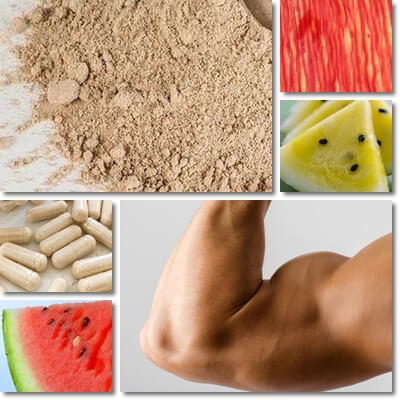Citrulline is a dietary supplement fairly well known in the bodybuilding world. What citrulline purportedly does for bodybuilding is help lower blood pressure and improve blood flow, with benefits for exercise endurance and exercise performance. Citrulline taken before or after a workout is said to act as a workout booster, delaying muscle fatigue and providing benefits for muscle maintenance and possibly also muscle growth.
The dietary supplement has scientifically been shown to help relieve muscle soreness post-workout, but does not improve muscle recovery after intensive or resistance exercise.
What is citrulline?
Citrulline is best known as a dietary supplement for muscle growth and bodybuilding. It comes in two forms: L-citrulline which is pure citrulline, and citrulline malate which is citrulline together with malate which is a salt of malic acid (in a ratio of 1:1 or 1:2).L-citrulline supplements in combination with arginine and nitric oxide are also available. L citrulline supplements are available as powder or pills. The best dosage for L-citrulline and citrulline malate for bodybuilding and exercise support in general is the dosage recommended on the label of the product. In case of pre-existing conditions that require treatment with medication, discuss supplementation benefits and risks and dosage with your doctor.

What does citrulline do for bodybuilding?
The benefits of citrulline, whether L-citrulline or citrulline malate, for bodybuilding stem primarily from its effects on the cardiovascular system. The body uses citrulline to produce arginine which is used for the synthesis of nitric oxide. Nitric oxide has vasodilating effects and benefits for blood pressure control. By contributing to vasodilation, citrulline supports a higher blood flow to muscles, with benefits for exercise endurance and exercise performance. Studies also show citrulline together with exercise contribute to increased muscle protein synthesis, which contributes to muscle growth and bodybuilding. Citrulline has also been shown to help lower fat mass and increase lean body mass and even muscle mass. Citrulline is ergogenic and acts as a workout booster.
Does citrulline help build muscle?
Citrulline helps build muscle both directly and indirectly. Animal studies show citrulline supplementation contributes to a reduction in fat mass and an increase in lean mass as well as muscle mass, modulating body composition directly. Studies show citrulline supplementation together with endurance exercise stimulates muscle protein synthesis, with direct benefits for muscle growth. Citrulline also helps build muscle indirectly by improving cardiovascular markers such as blood pressure and heart rate, providing benefits such as increased exercise endurance which favors muscle building. Research has shown supplementation also helps delay exercise related muscle fatigue and relieve muscle soreness which further supports athletic performance and helps build muscle.
Is citrulline malate better than citrulline?
Is citrulline malate better than citrulline for bodybuilding and muscle growth? Research on citrulline shows supplementation with both pure citrulline, or L-citrulline, and citrulline malate produces results in terms of muscle growth and bodybuilding, but also blood pressure control, heart rate control and exercise endurance and performance.
Learn more about the difference between the two types of citrulline in the article citrulline vs citrulline malate.

Citrulline benefits for bodybuilding
- Raises levels of arginine which helps with nitric oxide production for blood pressure regulation (source, source 2)
- Vasodilating properties, supports higher blood flow to muscles, with benefits for exercise endurance and exercise performance
- Helps improve blood circulation, with benefits for muscle maintenance
- Vasoprotective action with added antioxidant benefits
- Supports protein metabolism with benefits for muscle building
- Ergogenic benefits, helping boost energy levels pre-workout (source)
- Relieves exercise-induced muscle soreness (source)
- Delays exercise-related muscle fatigue with benefits for exercise endurance
- Boosts athletic performance through vasodilation support for higher blood flow to muscles, protein metabolism support and ammonia detoxification support (ammonia is a normal metabolic waste product) (source)
- Benefits for high heart rate which provides exercise performance support
- Modulating body composition with benefits for muscle building. Animal studies show a 9% higher lean body mass, 13% lower fat mass, and 14% to 48% higher muscle mass, depending on the type of muscle (source)
- Citrulline supplementation together with endurance training-type exercise modulates energy and muscle protein metabolism, with benefits such as increased muscle protein synthesis (by more than 27% and 33% – source)
Note: Citrulline supplementation, whether with L-citrulline or citrulline malate, is not a magic pill for bodybuilding, muscle growth or weight loss benefits. Its effects do not outweigh those of a poor diet or substitute exercise. Instead, citrulline supplementation acts as support and favors the transition to a healthier, leaner body in the setting of healthy eating and regular exercise, supporting exercise endurance and athletic performance through blood pressure control, heart rate control, vasodilation and improved blood circulation that allow a higher blood flow to muscles, as well as protein metabolism support.
Citrulline before or after a workout?
If you are considering supplementation with citrulline for muscle growth and bodybuilding or exercise performance in general, you may be asking yourself: should I take citrulline before or after a workout? Citrulline has ergogenic benefits, raising energy levels, and acts as a workout booster which is why it’s a good idea to take it some time before a workout. You can take citrulline in the morning at breakfast if you are exercising early in the day, or a few hours before exercising if the workout is set to take place later in the day.
